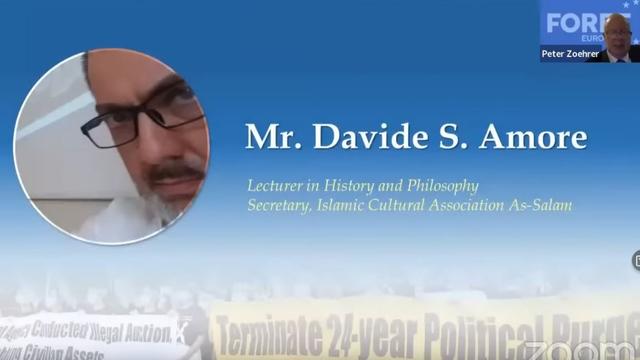Muslims believe that solidarity is a natural feeling, but it should be cultivated. Similar ideas exist in most religions, and inspire us in our solidarity with Tai Ji Men.
by Davide S. Amore*
*Introduction of the testimonies at the seminar “Global Solidarity with Tai Ji Men: 26th Anniversary of the Raid Which Began the Tai Ji Men Case,” co-organized on December 19, 2022, on the eve of International Human Solidarity Day, in Pasadena, California, by CESNUR, Human Rights Without Frontiers, the Tai Ji Men Qigong Academy, the Association of World Citizens, Action Alliance to Redress 1219, the website TaiJiMenCase.org, and FOREF (Forum for Religious Freedom Europe).

My name is Davide Suleyman Amore. I am an Italian historian of religions, a Muslim converted since the age of 18, a member of the Italian Association of History of Religions (SISR), and the secretary of “As-Salàm” Islamic Cultural Association, whose principal activity is to coordinate our local mosque program, where sometimes I happen to serve in the role of Imam.
I have been asked to introduce—and I would like to thank you all for the opportunity and the trust placed in a complete stranger to most of you—the session where dizi (disciples) of Tai Ji Men will offer their testimonies, remembering the day when the Tai Ji Men case started, December 19, 1996, and preparing the United Nations International Human Solidarity Day, December 20.
The two memories are somewhat connected. The sad events of December 19 were also the starting point of a great adventure of solidarity. All Tai Ji Men dizi showed their solidarity to their Gran Master, his wife, and the dizi who had been unjustly detained. A chain of solidarity was created that went from generation to generation and arrives to our days, supporting Tai Ji Men protests and their fight for justice. Now this solidarity also extends to foreign scholars and human rights activists from all over the world. Not only the chain resists. It gets longer.
Solidarity is an important value in the conscience-based ethics of Tai Ji Men. It is also an important value in Islam, and we as Muslims—I mean the right-guided ones, not those driven by lust for power—can only join in this sentiment.
Let me give a couple of examples that show how solidarity is conceived according to our Islamic belief system.
﴿وَإِن يُرِيدُوٓا۟ أَن يَخْدَعُوكَ فَإِنَّ حَسْبَكَ ٱللَّهُ ۚ هُوَ ٱلَّذِىٓ أَيَّدَكَ بِنَصْرِهِۦ وَبِٱلْمُؤْمِنِينَ وَأَلَّفَ بَيْنَ قُلُوبِهِمْ ۚ لَوْ أَنفَقْتَ مَا فِى ٱلْأَرْضِ جَمِيعًۭا مَّآ أَلَّفْتَ بَيْنَ قُلُوبِهِمْ وَلَـٰكِنَّ ٱللَّهَ أَلَّفَ بَيْنَهُمْ ۚ إِنَّهُۥ عَزِيزٌ حَكِيمٌۭ﴾
(If they intend to deceive you, Allah is enough for you. It is He who supported you with His help and with the believers, *and unified their hearts. Even if you had spent everything on the earth, you could not have unified their hearts. But Allah has unified them. He is Almighty, All-Wise: Holy Qur’an 8, 62–63).

And again:
حَدَّثَنَا أَبُو عَامِرٍ عَبْدُ اللَّهِ بْنُ بَرَّادٍ الأَشْعَرِيُّ، وَأَبُو كُرَيْبٍ مُحَمَّدُ بْنُ الْعَلاَءِ – وَتَقَارَبَا فِي اللَّفْظِ – قَالاَ حَدَّثَنَا أَبُو أُسَامَةَ، عَنْ بُرَيْدٍ، عَنْ أَبِي بُرْدَةَ، جَدِّهِ عَنْ أَبِي مُوسَى، عَنِ النَّبِيِّ ﷺ قَالَ “ رَأَيْتُ فِي الْمَنَامِ أَنِّي أُهَاجِرُ مِنْ مَكَّةَ إِلَى أَرْضٍ بِهَا نَخْلٌ فَذَهَبَ وَهَلِي إِلَى أَنَّهَا الْيَمَامَةُ أَوْ هَجَرُ فَإِذَا هِيَ الْمَدِينَةُ يَثْرِبُ وَرَأَيْتُ فِي رُؤْيَاىَ هَذِهِ أَنِّي هَزَزْتُ سَيْفًا فَانْقَطَعَ صَدْرُهُ فَإِذَا هُوَ مَا أُصِيبَ مِنَ الْمُؤْمِنِينَ يَوْمَ أُحُدٍ ثُمَّ هَزَزْتُهُ أُخْرَى فَعَادَ أَحْسَنَ مَا كَانَ فَإِذَا هُوَ مَا جَاءَ اللَّهُ بِهِ مِنَ الْفَتْحِ وَاجْتِمَاعِ الْمُؤْمِنِينَ وَرَأَيْتُ فِيهَا أَيْضًا بَقَرًا وَاللَّهُ خَيْرٌ فَإِذَا هُمُ النَّفَرُ مِنَ الْمُؤْمِنِينَ يَوْمَ أُحُدٍ وَإِذَا الْخَيْرُ مَا جَاءَ اللَّهُ بِهِ مِنَ الْخَيْرِ بَعْدُ وَثَوَابُ الصِّدْقِ الَّذِي آتَانَا اللَّهُ بَعْدُ يَوْمَ بَدْرٍ ” .
(Abu Musa reported Allah’s Messenger [ﷺ] as saying: «I dreamt (while asleep) that I was about to migrate from Mecca to a land abounding in palm trees and I guessed that it would be Yamama or Hajar, but it was the city of Yathrib [the old name of Medina], and I saw in this dream of mine that I was brandishing a sword and its upper end was broken and this is what fell [in the form of misfortune to the believers on the Day of Uhud]. I brandished (the sword) for the second time and it became all right, and this is what came to be true when Allah granted us victory and solidarity of the believers. And I saw therein cows also and Allah is the Doer of good. These meant the group from amongst the believers on the Day of Uhud and the goodness which Allah brought after that and the reward of attestation of his Truth which Allah brought to us after the Day of Badr»: Sahih Muslim 2272, Book 42, Hadith 38).
I hope these two examples are sufficient to show how solidarity is conceived, according to Islamic doctrine. In other words, solidarity is seen as a feeling that is instilled in human beings almost from Above, when they witness the misadventures of a fellow human being. This means that not everyone feels this feeling, as indeed today’s chronicles show us, but rather the more one is spiritually and intellectually elevated, the more solidarity takes root easily in one’s heart.
After all, what I have just stated is demonstrated by our meeting itself, which bears witness to the fact that, beyond the differences given by the religious, philosophical and doctrinal affiliations of each of those present, the common—I presume—degree of spiritual and philosophical elevation means that we are all united as one in advancing this cause.

So, in presenting the testimonies of the dizi, I compliment them as witnesses of solidarity, and hope we can all share and work together within the great framework of the human value of solidarity.
Source: Bitter Winter

